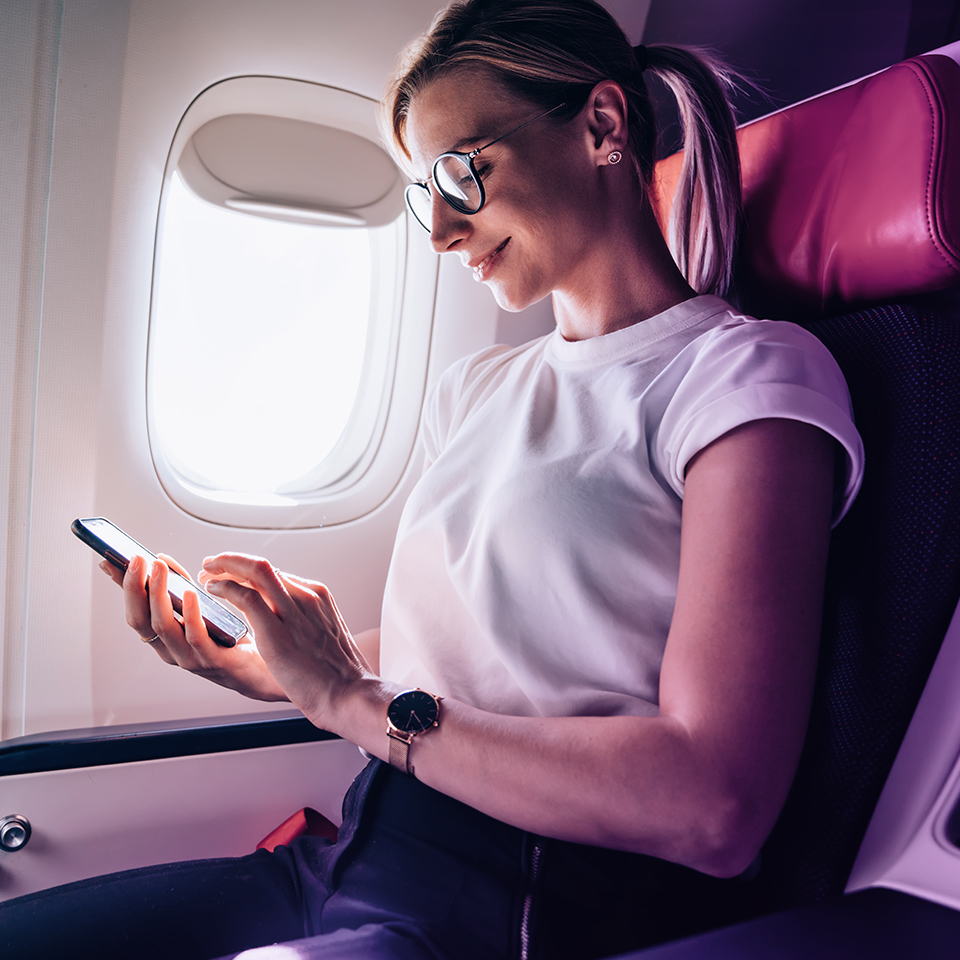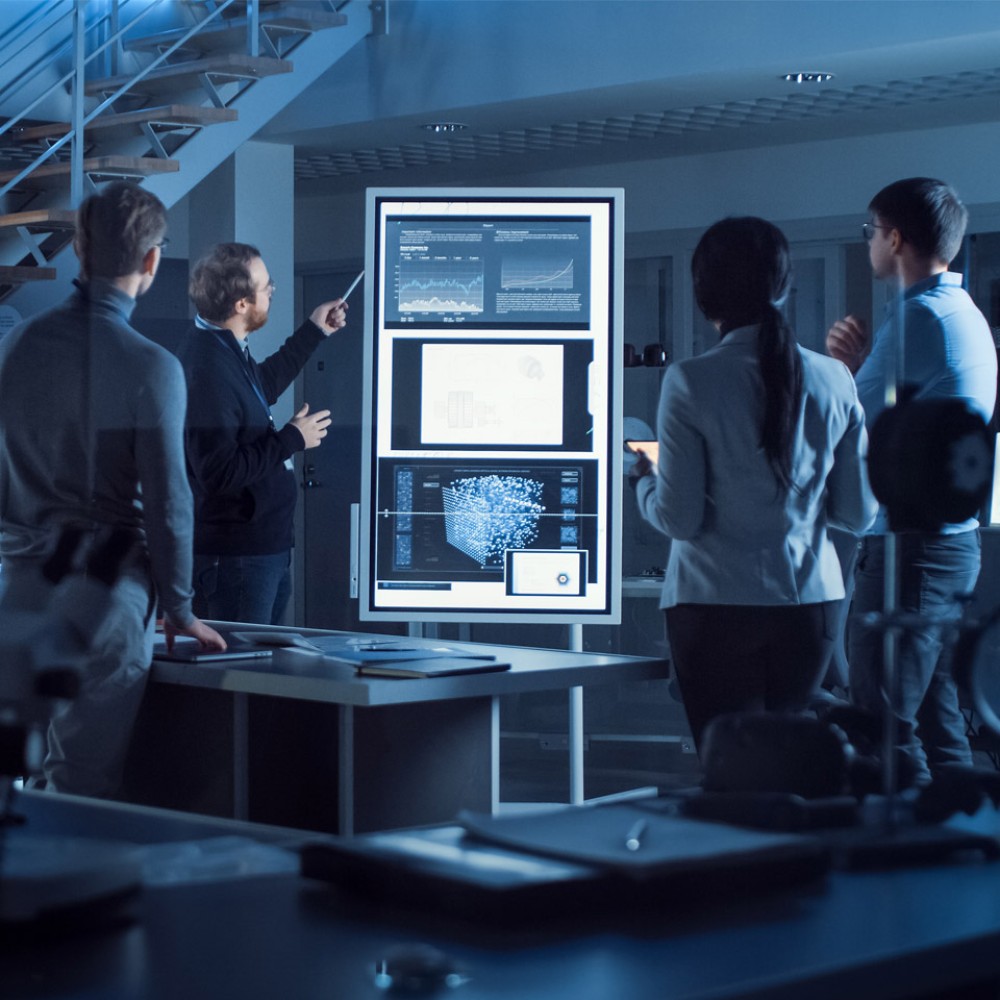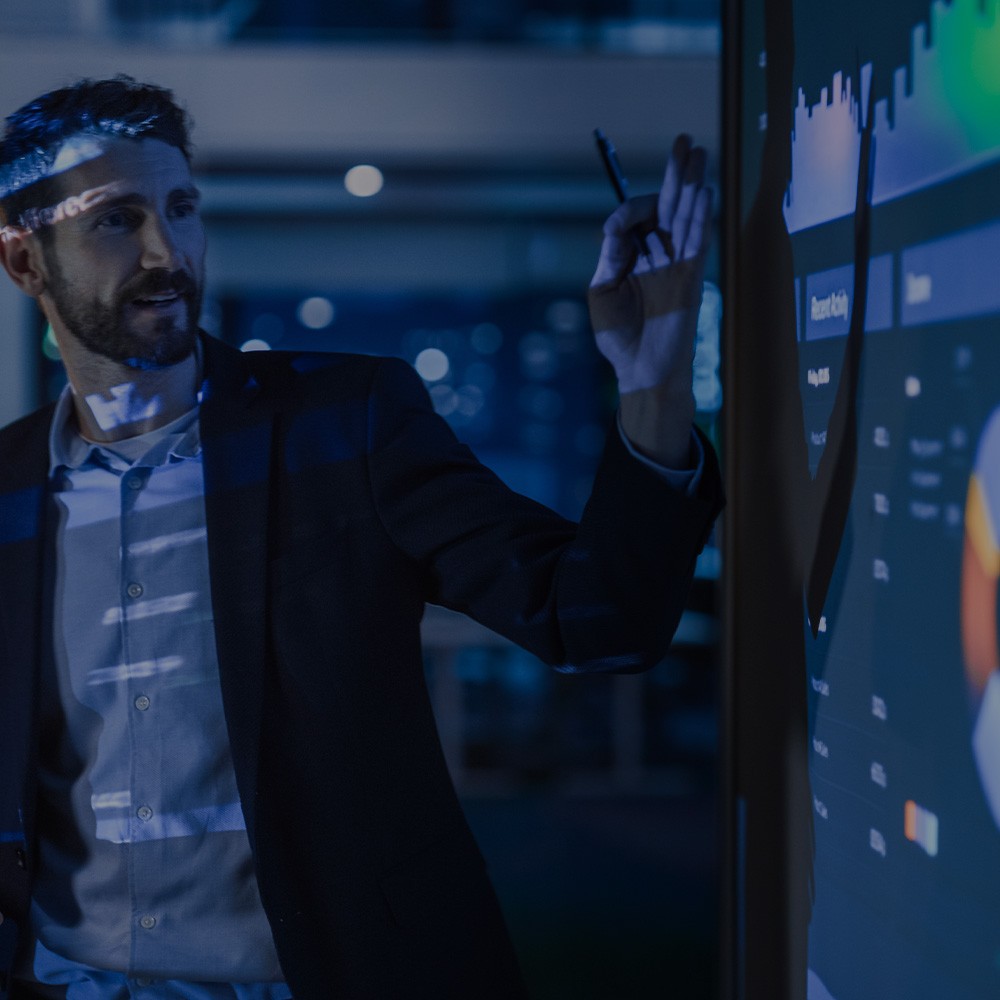In brief
- Modern traveler's evolution: The post-pandemic era has seen a shift in travel patterns, with a rise in digital nomad culture and an emphasis on safety, flexibility and digital convenience
- Machine learning's role: Machine learning is central to the digital transformation in travel. It aids in understanding and predicting traveler behavior, offering predictive personalization and enhancing operational efficiency
- The future of travel: The travel industry is heading toward software-defined experiences with technologies like AR/VR, adaptive itineraries and intelligent recommendations. Strategic partnerships and holistic approaches are essential for aligning technological solutions with business goals
In the wake of a global pandemic, the travel industry is undergoing a transformative shift. As international tourism rebounds, with regions like Europe and the Middle East witnessing a surge in visitor numbers, there's a clear indication of the industry's resilience. However, this resurgence isn't just about numbers; it requires a better understanding and predicting travelers' behavior and preferences. With the rise of the digital nomad culture and changing travel patterns, businesses must harness the power of technology to stay ahead.
What defines a modern traveler
In today's dynamic landscape, understanding the traveler is more crucial than ever. With technology at their fingertips, travelers are redefining the norms, seeking better experiences that resonate with their needs. According to recent reports, the industry's growth trajectory is promising, but it's also riddled with challenges, from labor shortages to the need for digital innovation. Having clear vision of who the modern traveler is and how businesses can cater to them is essential.
The rise of the digital nomad
The concept of 'work from anywhere' has gained significant traction. Professionals are no longer tied to their office desks. Instead, they're exploring global destinations, not just for leisure but for long-term stays, merging work with the joy of travel. This phenomenon is not just a trend; it's a testament to the evolving definition of work and leisure driven by technological advancements.
Post-COVID-19 travel patterns
Following the recovery of international travel, regions like Europe are witnessing a surge in visitor numbers, nearing pre-pandemic levels. However, some patterns have changed noticeably:
- Safety first. Travelers expect stringent hygiene standards and clear health protocols across all touchpoints
- Flexibility. Free cancellations, easy rescheduling, and transparent refund policies have become paramount
- Digital convenience. Expectations now include seamless online bookings, contactless check-ins and digital payment options
- Informed choices. Real-time information on destination safety and local guidelines is crucial
- Holistic sanctuaries. Destinations offering digital amenities, like robust Wi-Fi and a relaxing environment are in demand
The industry's challenge is ensuring that these evolving needs are met with innovation and efficiency.
Tailoring to the new traveler
For platforms like Expedia, it's not just about listing destinations; it's about understanding this new traveler. With the industry facing challenges like labor shortages, there's a pressing need to leverage technology to address these pain points. By harnessing machine learning and data analytics, travel platforms can predict preferences, offer personalized experiences, and ensure seamless interactions, increasing satisfaction rates across various demographic groups.
Characteristics of the new-age traveler
The modern traveler is an amalgamation of diverse traits sculpted by digital influences
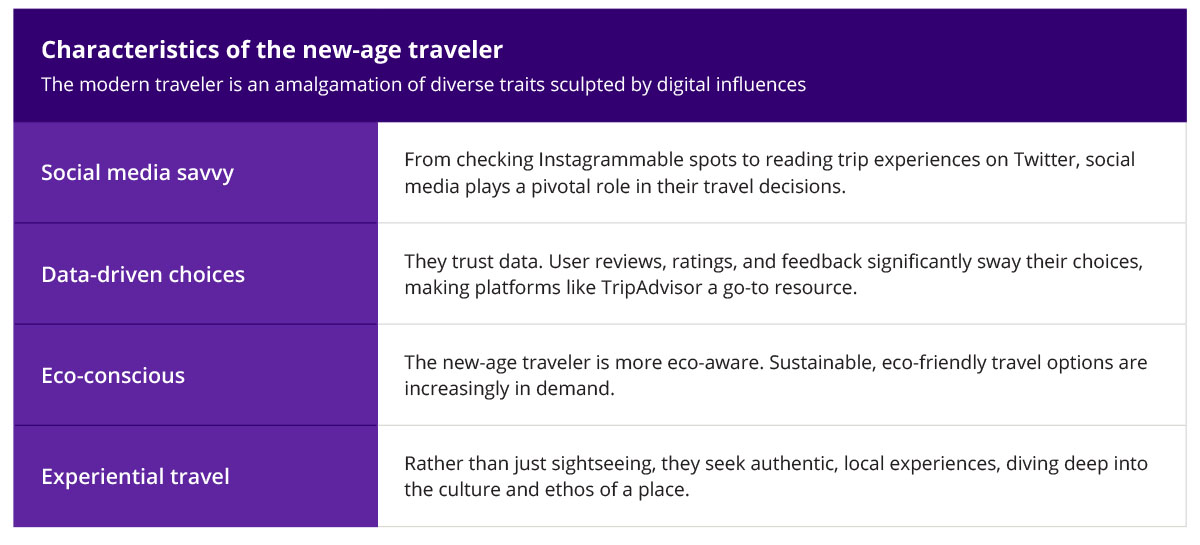
Machine learning at the center of digital transformation in travel
For travel and tourism businesses in the contemporary digital landscape, machine learning has emerged as a pivotal technology, driving significant operational transformations. Machine learning harnesses the power of autonomous data analysis, allowing systems to refine their algorithms by discerning intricate patterns and insights. This capability is invaluable in data-rich sectors like travel, where nuanced understanding and prediction of traveler behavior are essential for success.
Understanding traveler behavior
Every time a person searches for a flight, books a hotel or reads reviews about a destination, they leave digital footprints. These footprints, when analyzed collectively, reveal intricate patterns of traveler preferences and behaviors. Machine learning algorithms can sift through this data to discern what travelers truly want and develop insights for better decision-making.
Predictive personalization
Beyond just understanding current behavior, machine learning excels in predicting future actions. For instance, if a traveler frequently books seaside resorts during the summer months, machine learning can anticipate this and offer tailored recommendations as summer approaches. This level of predictive personalization ensures that travelers are presented with options that resonate with their preferences, even before they actively seek them out.
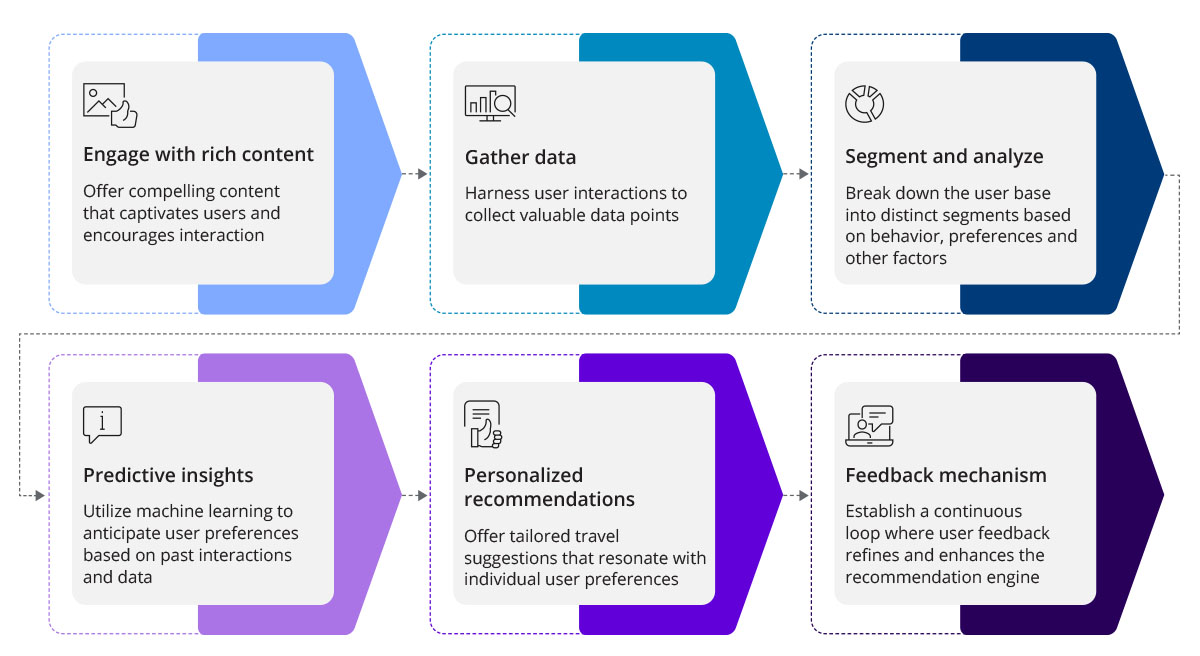
Enhancing operational efficiency
It's not just the customer-facing side of travel that benefits from machine learning. Behind the scenes, operations can be optimized using these algorithms. From forecasting demand to optimizing pricing strategies and managing inventory, machine learning can streamline various operational aspects, ensuring businesses run efficiently while maximizing profitability.
Moreover, machine learning and big data technologies contribute to increased data security. Considering the sensitive nature of personal information gathered by travel platforms, reducing data breach risks and mitigating such instances is essential for an efficient use of data.
Feedback loop for continuous improvement
One of the standout features of machine learning is its ability to learn and improve continuously. As more travelers interact with a platform, the algorithm becomes better at understanding and serving them. This feedback loop ensures that the travel experience is constantly evolving and improving, much to the delight of travelers.
Essentially, machine learning in travel is revolutionizing the industry by offering unparalleled insights into traveler behavior and preferences. By harnessing this technology, travel platforms can not only enhance the user experience but also streamline operations, setting the stage for a future where travel is more personalized, efficient, and delightful than ever before.
Harnessing machine learning and big data in travel
Leading travel platforms, with Expedia as a notable example, are poised to reap significant benefits from the combined power of machine learning and big data. While many platforms have started to harness these technologies, a vast realm of untapped potential remains. Some recent reports emphasize the ongoing digital transformation in travel, highlighting the need for enriched digital experiences.
The era of personalized journeys
Travelers today are not just looking for destinations; they're seeking experiences that align with their unique lifestyles and preferences. The power of machine learning, combined with big data, allows platforms to:
- Understand digital lifestyles by recognizing tendencies like a user's inclination towards the digital nomad lifestyle
- Cater to modern needs by suggesting destinations equipped with robust Wi-Fi, co-working spaces, and other amenities that cater to the modern traveler
- Deliver authentic experiences by offering local experiences that align with a traveler’s interests, ensuring their journey is as unique as their preferences
This fusion of machine learning and big data is redefining what it means to travel. Not only do the technologies improve personal experiences, but they also significantly enhance business capacity to operate more efficiently and provide better quality of service to their clients.
Technological trends in the travel industry
The emerging technology trends in the travel industry and the growing influence of artificial intelligence in travel are reshaping its trajectory. As these technologies integrate more deeply into travel platforms, they promise to redefine the travel experience in several groundbreaking ways.
Immersive experiences
The advent of augmented reality (AR) and virtual reality (VR) is set to revolutionize the way travelers explore potential destinations.
- Virtual reconnaissance. Before committing to a trip, travelers can embark on virtual tours, experiencing the sights and sounds of a destination from the comfort of their homes
- Interactive learning. AR can overlay historical facts, cultural insights, or user reviews on real-world landmarks, turning city walks or museum visits into rich, interactive learning experiences
Adaptive itineraries
The dynamic nature of travel demands flexibility, and future platforms will be equipped to offer just that.
- Real-time adjustments. Whether there's a sudden festival that might interest the traveler, unexpected weather changes, or local events that might disrupt plans, platforms will adjust itineraries in real time, ensuring travelers have the best experience possible
- Mood-based recommendations. Leveraging AI, platforms could suggest activities based on a traveler's current mood or past preferences
Intelligent recommendations
The power of big data and machine learning will be harnessed to offer travelers suggestions that feel tailor-made.
- Deep learning insights. By analyzing past behaviors, platforms can discern patterns and provide relevant suggestions to improve the experience
- Feedback-driven refinements. Continuous feedback loops will allow platforms to refine their suggestions. If a traveler consistently rates certain types of activities highly, the platform will prioritize similar recommendations in the future
As technologies, especially machine learning, continue to reinvent the travel industry, there is a growing need to manage emergent software solutions to get the needed outcomes for businesses and clients.
Navigating the future of travel: A comprehensive approach
While technical expertise is essential in the fast-paced travel industry, a broader understanding of the sector's intricacies is equally crucial. It's not just about filling engineering roles or implementing technology; it's about forging strategic partnerships with businesses and finding new perspectives, visions and aspirations.
Established travel businesses have vast experience, but with technology and consumer behaviors constantly evolving, there's always room to refine the approach. Collaborating with a partner specialized in travel and hospitality software development can unveil new opportunities and address challenges that might be overlooked from a purely internal or technical viewpoint. The objective isn't about reinventing the wheel but optimizing it for a smoother journey.
To stay competitive, travel leaders should form strategic partnerships that align technical solutions with the broader business vision. Such collaborations often result in an improved understanding of client needs and better alignment of tech innovations with long-term objectives. Whether it's using machine learning for unique travel experiences or updating operations for present challenges, the focus is on creating solutions that support overarching business goals.
The future of travel is software-defined
As the travel industry undergoes significant transformation, the role of software-defined solutions becomes increasingly central to its evolution. Zoreza Global, with its deep expertise in machine learning and data analytics, is poised to contribute meaningfully to this change. Beyond just integrating advanced technologies, Zoreza Global's approach focuses on delivering tailored personalization and enhancing operational efficiency. The next decade of travel promises to be influenced by such expertise, moving the industry towards a future characterized by innovation, precision and transformative experiences.




